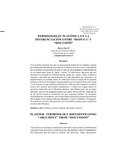Mostrar el registro sencillo del ítem
Terminología platónica en la diferenciación entre “disputa” y “discusión”
| dc.rights.license | http://creativecommons.org/licenses/by-nc-sa/3.0/ve/ | es_VE |
| dc.contributor.author | Ortiz Palanques, Marco | |
| dc.date.accessioned | 2022-04-25T19:47:41Z | |
| dc.date.available | 2022-04-25T19:47:41Z | |
| dc.date.issued | 2022-04-25 | |
| dc.identifier.issn | 1316-7939 | es |
| dc.identifier.uri | http://www.saber.ula.ve/handle/123456789/47978 | |
| dc.description.abstract | Este artículo pretende dar una caracterización inicial de los términos usados por Platón para diferenciar la postura de la disputa de la discusión. Entendiendo por la primera una posición en que el valor de los argumentos individuales no es tan importante como el lograr “vencer” al adversario; mientras que por discusión se entiende la reflexión hecha, punto por punto, sobre el tema en cuestión, valorando las consecuencias de cada argumento por separado y su utilidad hacia el resultado final. Se reflexiona sobre el origen de la posición sofistica a favor de la disputa, relacionándola con la forma política de Atenas y con el modo en que debieron enfrentarse a ella para dar respuestas teóricas acerca del carácter del hombre democrático y cómo este origen marcó su posterior desarrollo en la filosofía; mientras que Platón parte de un punto diferente, que es el de argumentar punto por punto, observando las congruencias de las partes hacia la formación de una respuesta global. Se estudian, principalmente, los términos con los que Platón caracteriza la posición sofística del combate en los diálogos Menón, República, Teeteto, Cármides y Protágoras. Se concluye con una contraposición de los términos usados para caracterizar la discusión Platónica. | es_VE |
| dc.language.iso | es | es_VE |
| dc.rights | info:eu-repo/semantics/openAccess | es_VE |
| dc.subject | Platón | es_VE |
| dc.subject | Sofistas | es_VE |
| dc.subject | Disputa | es_VE |
| dc.subject | Discusión | es_VE |
| dc.subject | Retórica | es_VE |
| dc.title | Terminología platónica en la diferenciación entre “disputa” y “discusión” | es_VE |
| dc.title.alternative | Platonic terminology differentiating “argument” from “discussion” | es_VE |
| dc.type | info:eu-repo/semantics/article | es_VE |
| dc.description.abstract1 | The article is an attempt to characterize the terms used by Plato to differentiate argument from discussion. In the first case, the intrinsic value of statements is less important than the need to “defeat” the adversary; while “discussion” presupposes that a theme will be considered point by point, each statement being evaluated for its implications and usefulness in leading to a conclusion. The origin of the Sophists’ position in favor of argument is considered, relating it to the Athenian political system and the need to struggle with this to provide theoretic answers to the question of the nature of a democratic man, at the same time as showing how this origin influenced the development of philosophy. Plato has a different point of departure: to “argue” from point to point, seeing how each part leads to a harmonious, global conclusion. The main focus of the article is the terms used by Plato to characterize the Sophists’ debating position in Menon, The Republic, Theaitetos, Charmides and Protagoras. It concludes by comparing the terms used to characterize Platonic discussion. | es_VE |
| dc.description.colacion | 77-100 | es_VE |
| dc.description.email | ortizmar@telcel.net.ve | es_VE |
| dc.description.frecuencia | Semestral | es |
| dc.description.paginaweb | https://saber.ula.ve/dikaiosyne/ | es |
| dc.identifier.depositolegal | pp-199802ME321 | es |
| dc.publisher.pais | Venezuela | es_VE |
| dc.subject.facultad | Facultad de Ciencias Jurídicas y Políticas | es_VE |
| dc.subject.institucion | Universidad de Los Andes | es_VE |
| dc.subject.keywords | Plato | es_VE |
| dc.subject.keywords | Sophists | es_VE |
| dc.subject.keywords | Argument | es_VE |
| dc.subject.keywords | Discussion | es_VE |
| dc.subject.keywords | Rhetoric | es_VE |
| dc.subject.tipo | Revistas | es_VE |
| dc.type.media | Texto | es_VE |
Ficheros en el ítem
Este ítem aparece en la(s) siguiente(s) colección(ones)
-
Dikaiosyne - Nº 005 Año III
julio - diciembre 2000


